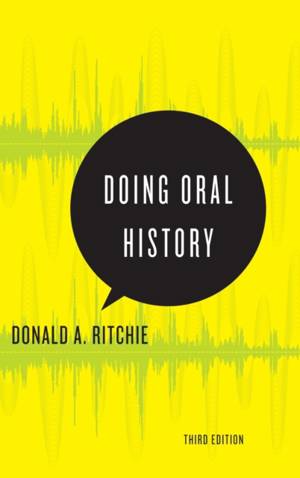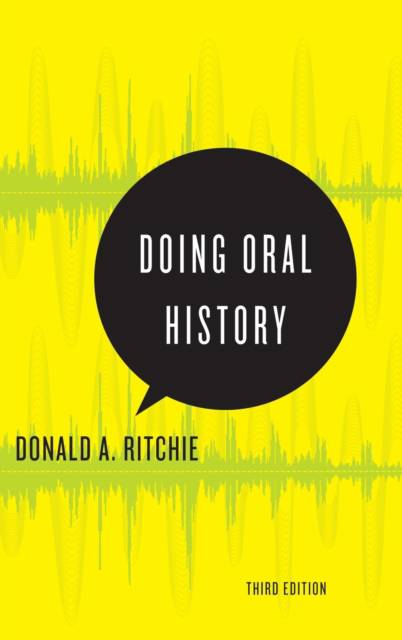
Door een staking bij bpost kan je online bestelling op dit moment iets langer onderweg zijn dan voorzien. Dringend iets nodig? Onze winkels ontvangen jou met open armen!
- Afhalen na 1 uur in een winkel met voorraad
- Gratis thuislevering in België vanaf € 30
- Ruim aanbod met 7 miljoen producten
Door een staking bij bpost kan je online bestelling op dit moment iets langer onderweg zijn dan voorzien. Dringend iets nodig? Onze winkels ontvangen jou met open armen!
- Afhalen na 1 uur in een winkel met voorraad
- Gratis thuislevering in België vanaf € 30
- Ruim aanbod met 7 miljoen producten
Zoeken
€ 145,45
+ 290 punten
Uitvoering
Omschrijving
Doing Oral History is considered the premier guidebook to oral history, used by professional oral historians, public historians, archivists, and genealogists as a core text in college courses and throughout the public history community. Over the past decades, the development of digital audio and video recording technology has continued to alter the practice of oral history, making it even easier to produce quality recordings and to disseminate them on the Internet. This basic manual offers detailed advice on setting up an oral history project, conducting interviews, making video recordings, preserving oral history collections in archives and libraries, and teaching and presenting oral history.
Using the existing Q&A format, the third edition asks new questions and augments previous answers with new material, particularly in these areas:
1. Technology: As before, the book avoids recommending specific equipment, but weighs the merits of the types of technology available for audio and video recording, transcription, preservation, and dissemination. Information about web sites is expanded, and more discussion is provided about how other oral history projects have posted their interviews online.
2. Teaching: The new edition addresses the use of oral history in online teaching. It also expands the discussion of Institutional Review Boards (IRBs) with the latest information about compliance issues.
3. Presentation: Once interviews have been conducted, there are many opportunities for creative presentation. There is much new material available on innovative forms of presentation developed over the last decade, including interpretive dance and other public performances.
4. Legal considerations: The recent Boston College case, in which the courts have ruled that Irish police should have access to sealed oral history transcripts, has re-focused attention on the problems of protecting donor restrictions. The new edition offers case studies from the past decade.
5. Theory and Memory: As a beginner's manual, Doing Oral History has not dealt extensively with theoretical issues, on the grounds that these emerge best from practice. But the third edition includes the latest thinking about memory and provides a sample of some of the theoretical issues surrounding oral sources. It will include examples of increased studies into catastrophe and trauma, and the special considerations these have generated for interviewers.
6. Internationalism: Perhaps the biggest development in the past decade has been the spreading of oral history around the world, facilitated in part by the International Oral History Association. New oral history projects have developed in areas that have undergone social and political upheavals, where the traditional archives reflect the old regimes, particularly in Eastern Europe, the Middle East, Asia, Africa, and Latin America. The third edition includes many more references to non-U.S. projects that will still be relevant to an American audience.
These changes make the third edition of Doing Oral History an even more useful tool for beginners, teachers, archivists, and all those oral history managers who have inherited older collections that must be converted to the latest technology.
Using the existing Q&A format, the third edition asks new questions and augments previous answers with new material, particularly in these areas:
1. Technology: As before, the book avoids recommending specific equipment, but weighs the merits of the types of technology available for audio and video recording, transcription, preservation, and dissemination. Information about web sites is expanded, and more discussion is provided about how other oral history projects have posted their interviews online.
2. Teaching: The new edition addresses the use of oral history in online teaching. It also expands the discussion of Institutional Review Boards (IRBs) with the latest information about compliance issues.
3. Presentation: Once interviews have been conducted, there are many opportunities for creative presentation. There is much new material available on innovative forms of presentation developed over the last decade, including interpretive dance and other public performances.
4. Legal considerations: The recent Boston College case, in which the courts have ruled that Irish police should have access to sealed oral history transcripts, has re-focused attention on the problems of protecting donor restrictions. The new edition offers case studies from the past decade.
5. Theory and Memory: As a beginner's manual, Doing Oral History has not dealt extensively with theoretical issues, on the grounds that these emerge best from practice. But the third edition includes the latest thinking about memory and provides a sample of some of the theoretical issues surrounding oral sources. It will include examples of increased studies into catastrophe and trauma, and the special considerations these have generated for interviewers.
6. Internationalism: Perhaps the biggest development in the past decade has been the spreading of oral history around the world, facilitated in part by the International Oral History Association. New oral history projects have developed in areas that have undergone social and political upheavals, where the traditional archives reflect the old regimes, particularly in Eastern Europe, the Middle East, Asia, Africa, and Latin America. The third edition includes many more references to non-U.S. projects that will still be relevant to an American audience.
These changes make the third edition of Doing Oral History an even more useful tool for beginners, teachers, archivists, and all those oral history managers who have inherited older collections that must be converted to the latest technology.
Specificaties
Betrokkenen
- Auteur(s):
- Uitgeverij:
Inhoud
- Aantal bladzijden:
- 368
- Taal:
- Engels
- Reeks:
Eigenschappen
- Productcode (EAN):
- 9780199395194
- Verschijningsdatum:
- 17/10/2014
- Uitvoering:
- Hardcover
- Formaat:
- Genaaid
- Afmetingen:
- 239 mm x 160 mm
- Gewicht:
- 657 g

Alleen bij Standaard Boekhandel
+ 290 punten op je klantenkaart van Standaard Boekhandel
Beoordelingen
We publiceren alleen reviews die voldoen aan de voorwaarden voor reviews. Bekijk onze voorwaarden voor reviews.











